Joined by Jesse Herb, Kevin Cookman and Aya Lehman are here to offer you the final takes on Sundance 2019!
You can read the Sundance 2019 Midway Roundup here.
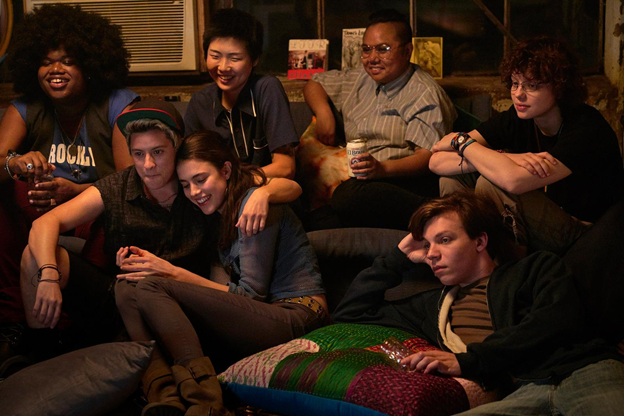
ADAM
Director: Rhys Ernst
Genre: Comedy
ADAM’s director Rhys Ernst actively kept the film, based on Ariel Schrag’s book of the same title, in the year 2006—an era of less LGBTQ+ visibility—so that there was a greater margin for error. The intention of ADAM is to remind its viewers, be they straight or not, that there’s always room to learn in this ever-evolving community. Adam is a high school student from Northern California who travels to New York to spend the summer with his older sister, an active member of the local LGBTQ+ community. There, he falls in love with Gillian, a 21-year-old lesbian. The two hit it off, but Adam quickly realizes that Gillian thinks that he’s a trans man, so he does intensive research on how to keep up the charade. AaaahhhhhHHHH!!!! AH! I am extremely uncertain about most aspects of this film, but the majority of the cast are actually in the LGBTQ+ community, the director is a trans man, and I spoke with several trans women who loved it, so one can only hope it’s not a complete disaster? It rubbed me entirely the wrong way, and spends its entire runtime toeing that extremely thin line between productive and harmful. I see its intentions, and I hope that audiences are up to the task of understanding what it’s going for. If not, this could be disastrous for the community as the film celebrates another cis straight white man who wreaks havoc on the lives of young LGBTQ+ people, but it’s okay because he learns something at the end! Aside from its potentially problematic plot, ADAM isn’t… Funny. Or very smart. Most of its laughs come from visual gags that remind the viewer that it’s extremely 2006. The audience roared when Ethan (Leo Shang, who’s the shining star of the film), flips open his Sidekick. That’s… The whole joke. I’m extremely curious to see how it’s received, although it has yet to be picked up. [Aya Lehman]
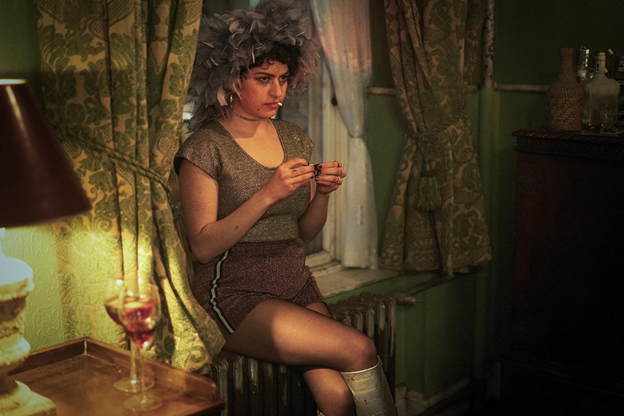
ANIMALS
Director: Sophie Hyde
Genre: Drama
An edgy FRANCES HA wannabe that sides with the Sophie character instead of Frances, ANIMALS follows best friends Tyler (Alia Shawkat, the Frances) and Laura (Holliday Grainger, the Sophie) and the evolution of their friendship as the two head into their 30s. Director Sophie Hyde employs some impressive camera and editing techniques to inspire genuine feeling, but a story that should focus primarily on the relationship between its two female leads gets distracted by their relationships with men and loses its footing. Some heavy-handed visual metaphors turn what could be a focused exploration of female friendship into a real drag. Alia Shawkat is so good as that debauched Oscar Wilde wannabe role that’s usually reserved for men that you wish you could just pluck her out of this and place her into a movie that actually works. [Aya Lehman]
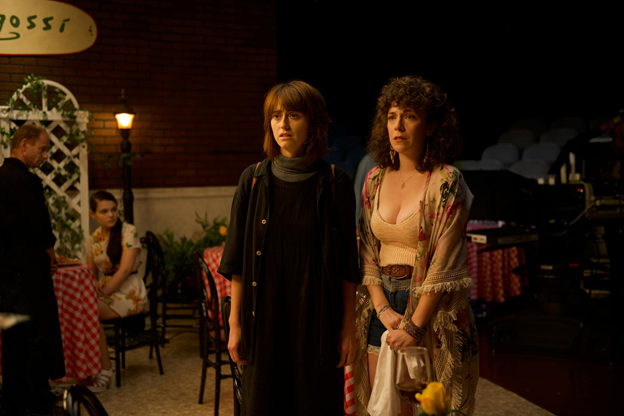
BEFORE YOU KNOW IT
Director: Hannah Pearl Utt
Genre: Comedy
An invention of the Sundance Institute’s Directors and Screenwriters Lab and recipient of the Adrienne Shelly Foundation Women Filmmakers Grant, BEFORE YOU KNOW IT offers a quirky, fun, and honest look at female relationships. Written by and starring Hannah Pearl Utt and Jen Tullock and directed by Utt, BEFORE follows Jackie and Rachel who discover, upon their father’s death, that their presumed-dead mother is actually the star of a major soap opera. The sisters’ relationship is so expertly fleshed out and GILMORE-esque that it feels like one could watch them banter for hours, let alone 90 minutes. The production design and locations for BEFORE are extremely hip and give an incredible texture to the film. The film is tonally a bit uneven in places, but finds its balance where it really counts. This is just clearly a film written by women for women to watch, with casual discussions of menstruation and queerness and mother-daughter relationships that you just don’t normally see on screen. Also, Mandy Patinkin delivers an absolutely stellar performance in less than 15 minutes of screen time, including a scene that gave me full-body goosebumps. Really hoping BEFORE YOU KNOW IT finds a home somewhere, because there is so much to look forward to from Utt and Tullock. [Aya Lehman]
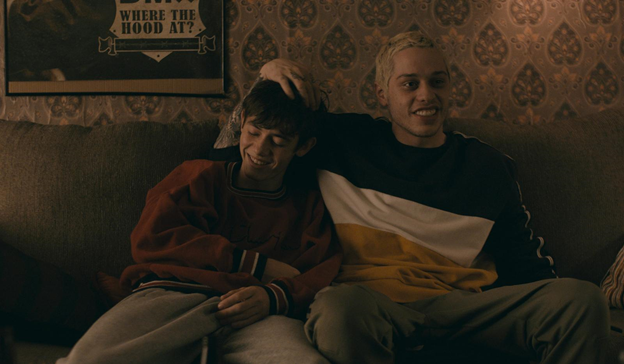
BIG TIME ADOLESCENCE
Director: Jason Orley
Genre: Comedy
I had a Zeke. His name was Jasper. I was miserable in 10th grade and he was a senior who smoked pot, had hot tub parties, and introduced me to the music of Kendrick Lamar, Death Grips, and SoundCloud. Jasper made me feel cool when no one else would entertain it and even imparted his own tastes onto me—the sense of belonging and exponentially increased self-worth shaped my entire adolescence. I have no clue where he is now, and we didn’t keep in touch when we went to college: Jasper is a mystery to me. This was purposeful. In BIG TIME ADOLESCENCE, 10th grader Mo experiences what happens when you follow your high school idol for too long and live to see them become the loser. His idol, of course, is Zeke, brought to life with a game-changing performance by tabloid-friendly SNL darling Pete Davidson in his first starring role. God, am I looking forward to this guy being in every single movie—his comic timing is indelible, his inviting charms understandably bewitching. You get why people will risk their parents’ love to be around him. Without him, unfortunately, BIG TIME ADOLESCENCE isn’t much. The film’s faults can be boiled down to how it maneuvers its clever “Mo Bamba” needle-drop, set during the many drug dealings of high school basement parties. During the iconic “FUCK! SHIT! BITCH!” mosh-inducer, writer/director Jason Orley has inconsequential dialogue play over it. Beyond the lyrics matching with the protagonist’s name, why bother with the track? Sometimes the movie is obsessed with its aesthetic, with some early editing choices promising a much more playful telling of the story than delivered, but often, it’s just doing the bare minimum to pass. It starts with a “You’re probably wondering how i got here” voiceover that is never returned to, hits overly familiar beats, and ends before BIG TIME ADOLESCENCE can really make a greater point about its characters. There are much worse ways to spend your 90 minutes, and this will likely strike a chord in the same way that the far superior SUPERBAD did for kids of the early 2010s who snuck a copy, but the real reason to buy a ticket is for the joy of sitting front-row for Davidson’s acting reel. [Kevin Cookman]
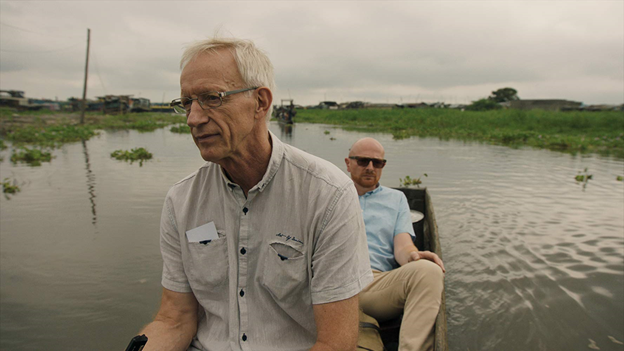
COLD CASE HAMMARSKJÖLD
Director: Mads Brügger
Genre: Documentary
Repeat after me: Hammer-shoald. There ya go. Daredevil documentarian Mads Brügger, years after trolling North Korea to their faces and impersonating a diamond-smuggling ambassador in the Central African Republic just to prove that he could, returns with a murder-mystery whodunnit in COLD CASE HAMMERSKJÖLD that appears tame on the surface, but unspools into the director’s finest synthesis of outlandish manipulations (Brügger, as is customary, stars and dresses up exactly how the “villain” of his story does, in full colonialist whites, mostly in part because he identifies with a fellow conniver in a different field of work) and white-knuckled, shocking factuality. Insular, nearly absurdist political intrigue, a spindling web that finds Brügger hilariously reaching a snag in the case that reveals a militia leader stealing his improv class classmate’s identity to sign off on genocidal documents, becomes the unraveling of a virally-induced holocaust. The story told turns so ghastly and major in its truths that even Brügger realizes that his comedy’s been misplaced and he’s in over his head. His transparency, and willingness to heartlessly self-efface, is so refreshing—without losing track of his goals as an investigative journalist, COLD CASE’s format matches the ebbing flows of the documentarian’s decision-making process on how to present a narrative. Loose ends, dead ends, looped ends, they’re all here, non-excised from a film format that would regularly edit out its own pitfalls. What info do you prioritize and is there value in abandoning your guiding thesis to trip down rabbit holes? Seeing as a crime against humanity is unveiled by jumping through outwardly nonsensical hoops, Brügger argues in favor of the art of the tangent. To find higher truths, we must venture outside the borders of conventional knowledge. Take notes, everyone: we should all be pursuing veracity and be learning from our mistakes as zealously as Mads Brügger does. [Kevin Cookman]
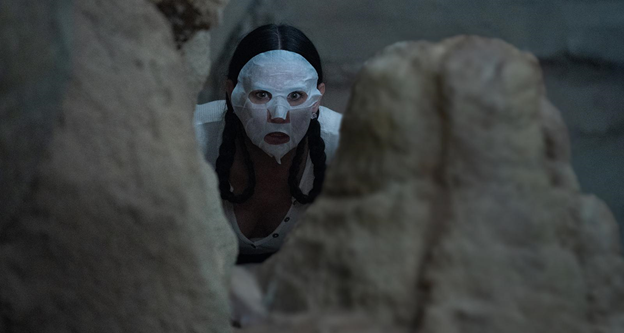
CORPORATE ANIMALS
Director: Sam Bain
Genre: Comedy
Hands down the worst film I had the pleasure of seeing at Sundance 2019. Stars Demi Moore doing her best Kyle Richards of THE REAL HOUSEWIVES OF BEVERLY HILLS impression and a cast of guest stars from your favorite NBC Thursday night comedy. There’s some solid comedy to be found between the Best Buy $5 DVD bargain bin-level jokes that pepper this season six of WORKAHOLICS bottle episode. Even the promise of a Britney Spears cameo (it’s just her voice) cannot save this mediocre film, although the Gary Sinise cameo did inspire a solid chuckle from the audience. It’s a real bummer, because Jessica Williams is, per usual, a delight, and the rest of the cast are surprisingly diverse. The most introspective CORPORATE ANIMALS gets is the discussion of wealthy white women in leadership roles who take on young WOC as their mentees in hopes that they’ll reap the benefits of inspiring the next Beyoncé. Fascinating! But not fascinating enough to endure CORPORATE ANIMALS! [Aya Lehman]
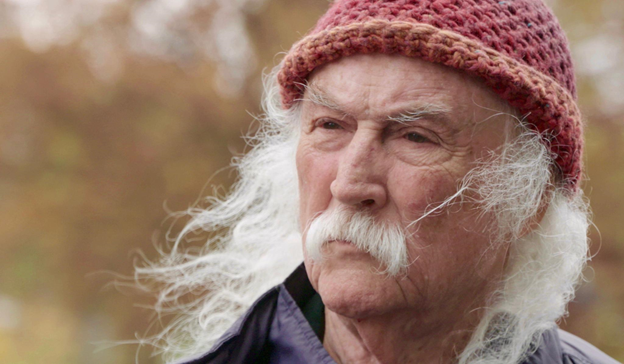
DAVID CROSBY: REMEMBER MY NAME
Director: A.J. Eaton
Genre: Documentary
Your standard doc about a well-known man with a bad reputation. Produced by Cameron Crowe (who also performs a substantial amount of interviews), DAVID CROSBY: REMEMBER MY NAME follows David Crosby as he hits the road for what very well may be his final tour. He’s been told by doctors he doesn’t have much time left, yet when given the option to stay with his family or hit the road again, his wife sighs, “I wanted him to choose family first. And I thought he would.” But Crosby is the only member of Crosby, Stills, Nash, & Young never to have his own hit single, and the amount this has weighed on him is palpable. While REMEMBER MY NAME follows Crosby on a journey through his past as well as the physical journey on tour, I was struck by a notable pattern. REMEMBER MY NAME and THE AMAZING JOHNATHAN DOC share the common denominator of a man on the precipice of death about to risk his health to go back on tour, and his wife who bears the emotional burden of her husband prioritizing his career over his family AND shouldering all the emotional baggage that her husband refuses to acknowledge. It’s exhausting, especially when the crux of this documentary rests on Crosby’s likability (or lack thereof). He notes all the women whose lives he permanently affected by introducing them to drugs and all the men he’s pissed off and he notes that he’s made amends with almost every woman, but his bandmates still refuse to talk to him. It’s just exhausting, ANOTHER rough-around-the-edges famous dude who’s like, “Maybe I’ve conned you into this. Maybe this is all a clever plan.” We get it dude. You’re hard to work with and you want to tell your side of the story. Whatever, if your dad is anything like mine, he’s gonna love this one. [Aya Lehman]

DIVINE LOVE
Director: Gabriel Mascaro
Genre: Sci-Fi, Drama
Ostensibly Brazilian BRAZIL, aiming its crosshairs on the commercialization of religion as means to obtain political power rather than the overall bureaucratic horrors of contemporary society, Gabriel Mascaro’s DIVINE LOVE runs its thin plot dry fairly quickly. Beginning with the Biblical self-awakening of the rave, Mascaro embarks on a God’s-eye journey into a dystopian future that blends sex and religion as one, but retains the same stigmas of the former. It’s all a not-so-subtle jab at President Bolsonaro’s vision for Brazil, a candidate who rose to power thanks to the same conservative populist fervency that underlines DIVINE LOVE’s starkly religious society. The initial impacts are scalding, but as the film goes on, it feels like a series of FUTURAMA jokes, like drive-thru orations, a major plot element, taken deathly seriously. The film errs on tedious more often than not, but there’s a sick joy in watching the film devolve into a domestic drama about a woman pregnant via miraculous conception who reaches a crossroads over her unborn baby being conceived by her husband or by God. Saucy! DIVINE LOVE gets better the more I think about it, but it really is a short film’s worth of content stuck in the body of an overlong feature. Did I really have to watch that many prolonged sex scenes? Did I *really* have to watch a graphic C-section birth? [Kevin Cookman]
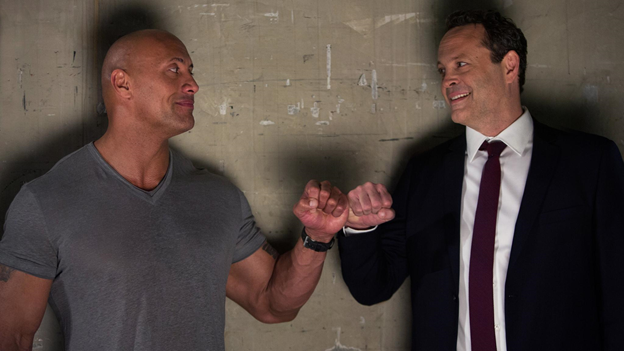
FIGHTING WITH MY FAMILY
Director: Stephen Merchant
Genre: Comedy
The surprise screening of Sundance 2019 was… The Rock’s family wrestling studio comedy biopic about WWE Diva Paige. Huh. This is definitely a far cry from the rumbling rumors of Jordan Peele’s US, the number one theory until SXSW claimed it as their opening night feature. And you know, even after seeing it, I feel like I got just as much out of having never seen it? FIGHTING WITH MY FAMILY is certainly funnier than I expected, the comedic talents of writer/director Stephen Merchant shining through as the reason to sit through this totally harmless thing, a film destined to persevere as your overseas Airbnb’s most prized shared living space English-language DVD, but there is nothing really new here to discuss or see or really do anything with. Instead, indulge me in my conspiracy theorizing that FIGHTING WITH MY FAMILY is the Randian manifesto of Dwayne “The Rock” Johnson, a hysteric megalomaniac on a campaign of unholy omnipresence who serves only to celebrate his own exceptionalism by consistently casting himself as the pinnacle of American heroism so he can ground the rest of us Earthlings into positions of subservience. At one point, he (may not actually be spoken by his character, but instead one of the many cyphers of his cult of personality) assures an amateur wrestler who has lost his shot at the big time that “just because a million people aren’t cheering when you do it, it doesn’t mean it’s not important,” and yet the film totally also celebrates being the one they cheer for. In fact, it makes it look like the dopest thing that could ever happen to you. The Rock makes it clear: it is okay to be you, good, even! But, oh man, is it incredible to be me. And you will never be me. Ahhh!! [Kevin Cookman]

GREENER GRASS
Director: Jocelyn DeBoer and Dawn Luebbe
Genre: Absurdist Comedy
Ladies, Gentlemen, and others of the jury, I ask you, “How could anyone not want to watch an, almost two-hour long, overexposed John Waters infomercial completely satirizing suburbia?”. GREENER GRASS is what I found to be one of the most successful shorts-turned-features to grace Sundance in recent memory. Debut Directors Jocelyn DeBoer and Dawn Luebbe created a work that goes beyond immersive and even palpable, straight into unavoidably close. GREENER GRASS endows with more information and less rules as the run time gets longer, and with each minute you cannot stop laughing, or wanting more. In the third act, when DeBoer’s character leaves her golf cart-infested, Americana dreamland you realize just how meticulously insular the film is. It’s not the moments where Lisa (Luebbe) gives birth to a soccer ball, or when Jill’s Husband Nick (Beck Bennett) sucks a pool water popsicle, it’s the dedication as a whole. Everything from the pastel color palette, to prop comedy, and even line delivery is calculated. That’s the beauty of absurdism: it’s the exact opposite of tossing darts at an idea board, and rather a fastidious effort of balance and humor. Of course this film still falls victim, as most absurdist works do, to losing traction in the second act. The jokes become stale and the shtick starts to fade; for a solid 15 minutes I ached for them to further the “serial killer” B-plot and find one of their housewives covered in an inordinate amount of blood. But by the end, after a good 20 minutes of recuperation, I realized that shock value is not an excuse for intrigue, and I thoroughly enjoyed how everything was handled. Not to mention the cherry on top, when the film’s producer affirmed that this script was carefully curated down to the period. In summation, it feels like DeBoer and Luebbe moonlighted as a demented seven-year-old playing with her braces-clad dolls, in their pink picturesque neighborhood, and I would do it again in a heartbeat. No further questions your honor. [Jesse Herb]

HAIL SATAN?
Director: Penny Lane
Genre: Documentary
Kevin slid me a note 10 minutes into HAIL SATAN? reading, “Question to the reader: why is every Satanist exactly what you think they’d look like?” It’s a valid question, and one HAIL SATAN? doesn’t ignore, and, if anything, leans into. Every member of The Satanic Temple is aware of how they appear to the average person, and they’re fully in on the joke. While their actions are tongue-in-cheek, there’s an intensity to every Satanist’s passion for fighting injustice and protecting human rights, and though some might argue that their approach is too subtle, there’s no disputing the efficiency of the movement. The central focus of Penny Lane’s documentary is the Satanists’ fight to erect a statue of Baphomet (an iteration of Satan) several yards away from a massive sculpture of The Ten Commandments on the grounds of the Arkansas State Capitol. They’re successful, of course, and ultimately you’re left wondering what the application process is like to join the Los Angeles Chapter. [Aya Lehman]
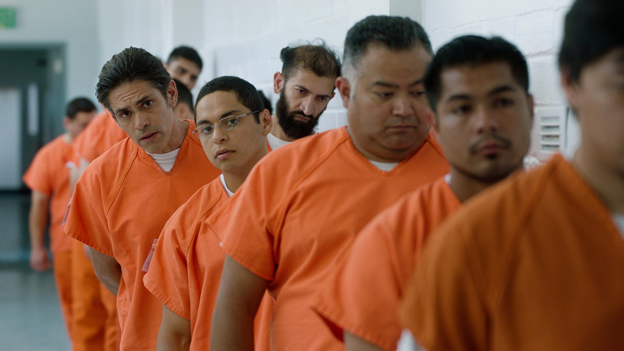
THE INFILTRATORS
Director: Cristina Ibarra, Alex Rivera
Genre: Docu-Fiction
THE INFILTRATORS is a critically uneven hybrid, its shallow and frankly uninformative documentary interstitials either erratically cutting into or out of rudimentary, overly dramatized reenactments that transcend bad filmmaking: they embody it. Following the attempts of a Florida youth group of undocumented immigrants infiltrating an ICE detention center to free a wrongfully imprisoned father, directors Cristina Ibarra and Alex Rivera risk mixing fact and fiction to paint a bigger picture, but the result is puzzling. Every spoken line in the reenactments is a twice-used platitude, and the actors, all quite rough, are markedly more attractive than their real-life counterparts. It’s so 2004 and I don’t get why these awful dramatizations are even here. The market is not rejecting documentaries. Audiences flock to great stories and the fictitious elements utilized here reek of filmmakers buckling under pressure, as if a person in a position of “power” told them that a doc was not enough. Its brisk pace feels like the product of editing down the project to consumable means, not in aid of the story, one so immense, needing to be told. Latinx filmmakers need to look back to the tactics of our ancestors, back to the revolutionary odes of Emilio Fernández and Felipe Cazals. This is playing so nice; name these ICE officers, walk the audience through exact step-by-step protocols to free captured brethren. THE INFILTRATORS is so cuddly: where is the hot-blooded vitriol? Our enemies are using nuclear arms, we need to strategize beyond throwing stones at their windows. THE INFILTRATORS presents dual perspectives of a successful protest, and yet I left with a cloudier vision of our present than I had before entering the theater. [Kevin Cookman]
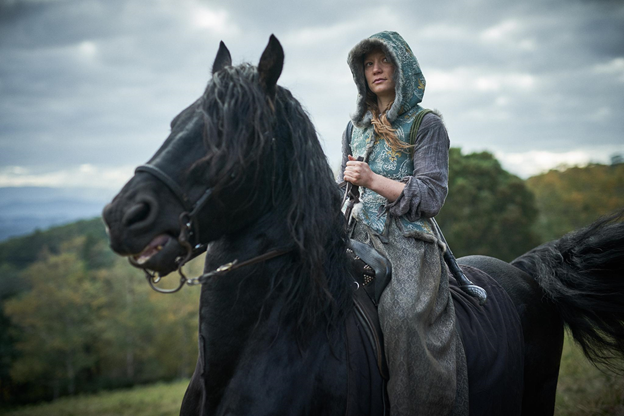
JUDY AND PUNCH
Director: Mirrah Foulkes
Genre: Fantasy
If there’s one thing to remember it’s that I would kidnap a thousand children before I stop watching Mia Wasikowska’s entire filmography. That being said, Mirrah Foulkes’ debut film was deserving of the disdainful sighs coming from 80% of its audience. While there are so many things done right, animals motifs including a dead rabbit paralleling Judy’s resurrection, a crocodile dream sequence representing the self-inflicted trauma via her abusive husband, and beautiful color symbolism aligning magic and the use of deep red, there’s so much that simply wasn’t. The film chronicles a married couple of puppeteers who find themselves squandered back to their forgettable hometown, Seaside. By the end of the first act, Mia Wasikowska is clubbed to death, her infant child thrown out the window, and an irrefutable feeling of “How did I end up here on a Friday at 3pm?” permeates. JUDY AND PUNCH had so much potential as it’s description rendered imagery resonant of SNOW WHITE AND THE HUNTSMAN meets KILL BILL (you would watch that, stop lying to yourself). However, what surfaces is one red crayon of a good idea that turns into the 64 pack: all mismatched and completely out of order. I sincerely wish that Foulkes had made this film later in her career, because it’s a massive undertaking that just deserved some focus and a couple more years on the back burner. [Jesse Herb]
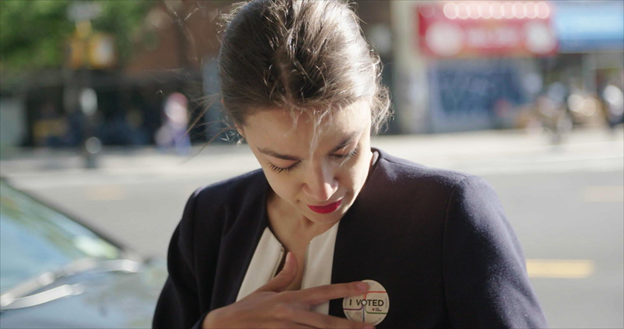
KNOCK DOWN THE HOUSE
Director: Rachel Lears
Genre: Documentary
What can I say? I cried watching Alexandria Ocasio-Cortez vote for herself in the New York City primaries. I cried watching four women work together to fight the stigma against women in politics as they run for office in Nevada, West Virginia, Missouri, and New York. A well-crafted documentary that knows exactly the power it holds, it never milks a music cue in hopes of making you cry, you just cry because of the sheer power of women. It effectively shows the eternal conflict of being a woman in the public eye and constantly having to force yourself to take up space and ignore the constant barrage of criticism from basically everyone, even members of your own party. Of course, when you have a star like Alexandria Ocasio-Cortez it’s difficult to focus on much else, but the film spends the majority of its time with Ocasio-Cortez. It doesn’t necessarily neglect the other three women, but it’s clear who the star is here. KNOCK DOWN THE HOUSE actually broke records as the highest-selling documentary in the festival’s history, going to Netflix for $10 mil. Hell yeah. [Aya Lehman]
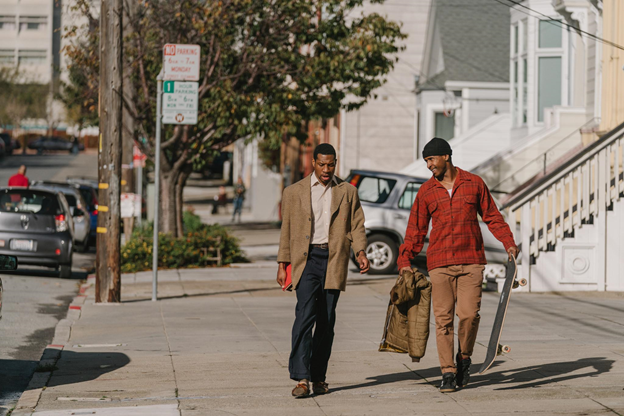
THE LAST BLACK MAN IN SAN FRANCISCO
Director: Joe Talbot
Genre: Drama, Comedy
One of the most buzzed-about films of the festival, both self-righteous and Spike-ish enough (Lee and Jonze) to likely propel its way into many folks’ best-of-the-year discussions, is Joe Talbot’s THE LAST BLACK MAN IN SAN FRANCISCO, a chronicle of a city that mixes the symphonic depictions of cityscape grandeur with the purposefully wide, flat blocking of eccentric comedy. Punctuated by poetic, protesting outbursts scored to intoxicating jazz choruses, it’s difficult not to get swept up in the movie’s frequent majesty, like watching our two main characters double-bomb a board down one of the city’s steepest hills. Our two protagonists are so pure of heart that their sterling rouses of childlike energy can make up for the film’s groaners. When a peculiar, elderly-dressing young man, approaches the gangbangers posted up across the street with stage directions concerning their stereotypical appearances, it’s difficult to not roll your eyes at the fake deepness at play, especially when you consider the director at the helm. Progressive insurrection in politics is paving the way for film narratives regarding the rightful ownership of property, both literally and figuratively, but what happens when the wave, spearheaded by people of color, is infiltrated by white artists? I mean, look at what we have here. White filmmaker from the Bay, the American region with the most egregious populist appropriation of its minority cultures’ colloquialisms and customs, decides to write and direct the urban treatise of a city that leeches off its oppressed, all the while turning a deaf ear to his own intensely parallel actions. Or we can read it as a fella who listens—with a story credit and lead acting position given to the indelibly splendid Jimmie Fails, a close friend of Talbot’s, THE LAST BLACK MAN IN SAN FRANCISCO slowly reveals itself as a piece of loving collaboration, the warts of ironic hypocrisy still intact. I’m looking forward to the discussions that will circle this one. [Kevin Cookman]

LATE NIGHT
Director: Nisha Ganatra
Genre: Comedy
Brandon Flowers once said that if you want to take a swing at using your art to make a political statement, “you better have a big bat.” Mindy Kaling steps up to the plate with LATE NIGHT and… walks. It’s not that this is a bad movie—there’s definitely a good movie hiding inside of it—it’s that this isn’t Kaling’s movie to make. LATE NIGHT attempts to take on affirmative action, depression, #MeToo, ageism, white privilege, sexism in the workplace, and the inherent terribleness of comedians. PHEW. There’s so much going on here that it feels like Kaling is just throwing relevant issues at the wall until something sticks. Nothing does! Per usual, Kaling’s best functions are to reveal the misogynist undertones of pseudo-intellectualism and to pepper in off-beat pop culture references, both of which she still does expertly. The supporting cast are all terrific, as Kaling has always had a knack for surrounding herself with your favorite Comedy Central recurring characters and SNL featured players. Emma Thompson is, per usual, breathtakingly good, and Hugh Dancy? Still hot! Wish they did more with him! With some editing and minor reshoots LATE NIGHT can easily be saved, but currently it feels like an over-long episode of THE MINDY PROJECT without the charm. [Aya Lehman]
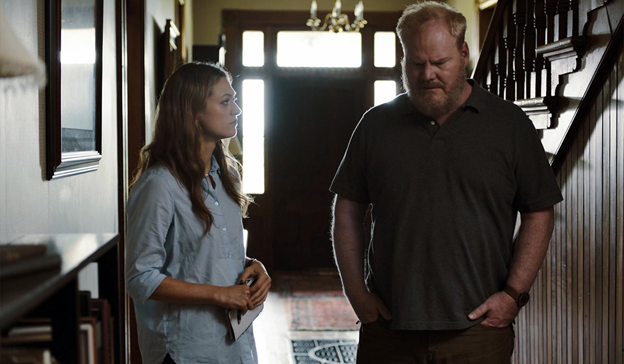
LIGHT FROM LIGHT
Director: Paul Harrill
Genre: Paranormal Drama
Descending from the well of David Lowery’s New American folklore comes Paul Harrill’s LIGHT FROM LIGHT, a well-meaning, sweet-hearted, and initially adroit study of indecisiveness versus certainty amidst the misty tall trees of East Tennessee. The protagonist, a practicing paranormal investigator-turned-car rental dealer, listens from the kitchen as her teenage son practices his class presentation in front of his girlfriend, speaking on a variety of Danish customs. The girlfriend corrects him, stating the assignment was to focus on one particular subject, and practices her presentation on Japanese tea ceremonies. “Are you a skeptic or a believer?”—is belief in the poly just a delusion of free will from believing in the very present mono? It’s all exceedingly clean, quiet storytelling, quite literally text book. Running a withdrawn 80-odd minutes, LIGHT FROM LIGHT, much like its ghost-hunting protagonist, fails to capture much more than the small messes humans make in pursuit of greater happiness and meaning. This is uncovering nothing a couple thousand other small films of this very ilk haven’t uncovered themselves, and with more electricity, even if Marin Ireland and Jim Gaffigan put in sturdy work. No stunning revelations or grand action, just people intently listening to one another. Emotionally gracious, but this leaves the impact of a single breath. [Kevin Cookman]
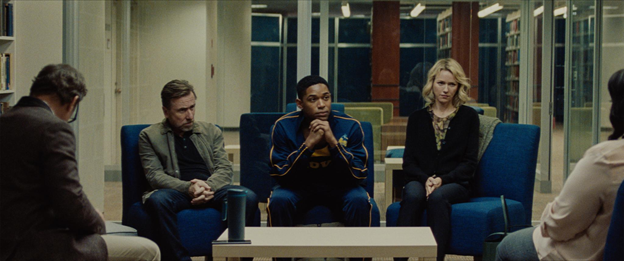
LUCE
Director: Julius Onah
Genre: Drama
God, Naomi Watts definitely hit her agent up for some topical content and that agent came back with some real leaded reads on the culture we live and breathe. LUCE, based on a play by JC Lee, feels out-of-step with the age of MAGA and more at home in the askew existence of Obama’s “post-racial” America, following an adopted, Black high school senior whose character comes under fire after he submits a role-play assignment to his history teacher wherein he identifies with a pan-African extremist. Later, he has illegal fireworks confiscated from his locker, and his adoptive parents, Naomi Watts and Tim Roth (who can, for the record, rivet me by reading the iTunes Terms and Conditions), reprising their FUNNY GAMES relationship. Okay, so a school paper and fireworks… You can’t help but expect something bigger. So what, the kid followed the assignment given and had some fireworks? That’s the drama? Folks: that’s the drama. LUCE is bizarre in how it thinks it is subverting the norms of discourse in regards to our relationship to stereotypes and diagnosing symptoms for others’ behaviors, yet it so clearly indulges in those very vices. Its open ending leaves the audience, and Luce’s parents, curious as to the goodness of his intentions—it’s a movie that goes so far into THE GOOD SON territory, the red flags of Luce’s possible sociopathy so bright, that it kind of invites you to be a racist and assume the worst about this young man. If that weren’t troubling enough, the simplicity in which the film tackles its ~big~ ideas is almost scary. The larger issue with making modern-feeling movies about the times we live in is that we are in an era of pedantically and fervidly stating our every belief, and so translating that to the page leaves a script with zero ambiguities. It feels like being trapped in a mingling circle during a cocktail party that’s been dominated by two heated debaters passionately making their cases with pure generalities and assumptions. Some will choose to engage in what feels like a pointless endeavor, with foreseen conclusions that only further the dangers of assumption, and others will sidestep away and get another drink from the open bar. Perhaps that is the very point LUCE is vying to prove about our discourse, but it seems to have inadvertently accomplished this through tiresome structure instead of content. [Kevin Cookman]
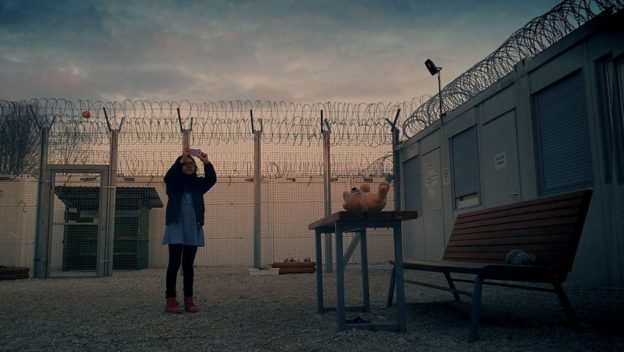
MIDNIGHT TRAVELER
Director: Hassan Fazili
Genre: Documentary
Lord, almighty. Hassan Fazili’s MIDNIGHT TRAVELER is similar to Jafar Panahi’s THIS IS NOT A FILM in that they are both artistic decrees of the self and the larger political sphere smuggled out of the country and constructed by an engaged third party — that they exist is an incredible achievement alone. Fazili, an Afghani filmmaker and cafe owner, became a target of the Taliban in the early 2010s and has been attempting to flee with his wife and two daughters ever since. Their long escape has been documented on three different mobile phone cams, edited together by Emelie Coleman Mahdavian, and oh man, where to even start with this. Migration via the digital eye sees the dehumanization and stripped creativity of its forced players, with a child exclaiming to her father “Daddy, that mountain looks like a painting,” only for him to shush her as they stealthily approach the Turkish border. Nargis, the eldest of the daughters, begins crying, nearly having a tantrum, in a Bulgarian refugee camp because she is so bored. It seems like brattiness at first, but what Nargis means by boredom is her deep unhappiness in inability to choose, every decision made fully dependent on the greed of smugglers, the half-hearted protective obligations of foreign diplomats, and the faint chances of mercy from bigots who don’t want Afghans within their borders. Each day spent migrating is marked by a title card, but the process goes on for so long that title cards begin skipping hundreds of days at a time – and this is for a family with some financial means. Chiefly ingenious is the film’s light, yet adept handle on aesthetic construction — the music scoring many of these scenes is a clipping, looping shred of flute, while montages of life lived before this living nightmare are scored with fully formed music. Sonically, the audience experiences the cyclical mistreatment of those seeking asylum; the snaking heartache is to continue with no end in sight. Blessings to the Fazili family and thank you for your story — we must desperately find a way to ameliorate this, for all. [Kevin Cookman]
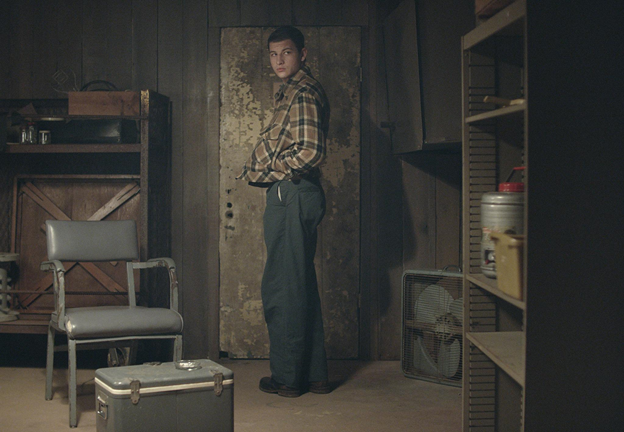
THE MOUNTAIN
Director: Rick Alverson
Genre: Period Drama
Rick Alverson wants to ruffle your feathers. If his previous devious anti-comedy cult classics have proven any one shared goal, it is to show you the miseries of an artistic existence while putting the viewer through them. THE MOUNTAIN, a stylistic evolution for Alverson, is a Pawlikowski-esque period piece following a hospital-hopping lobotomist, played by the sultry and ever-beddable Jeff Goldblum, and his emotionally mute mentee, Tye Sheridan, as they traverse one TITTICUT FOLLIES reenactment after another as if they were on a Mötley Crüe world tour. If anything, the funniest joke in THE MOUNTAIN is in its relation to the director’s past works: Alverson has explored the lives of the Brooklyn bohemian menace, comedians, and now men who find artistry in hammering needles under patients’ eyelids to pierce their prefrontal cortex. At the end of the day, how different is a socialite or up-and-coming entertainer? This director always shines in his acerbic central ideas, but each of his pictures, THE MOUNTAIN included, completely fall apart once he tacks on an overstuffed glacial narrative that continuously repeats itself. The decision to make Tye Sheridan the lead over Goldblum, who plays second fiddle, or even Denis Lavant, a hypnotic late addition to the story who is wisely given free reign to do and say whatever the hell he wants, is psychotic; I loved his turns as a child actor, but his performances as of late have had the charismatic grip of a wooden post. This feels way too up its own ass to be so obviously cribbing from THE MASTER, a similar film in content and portent, yet legions more successful in both, and while it follows the psychological breakdown of Sheridan, which by the way is triggered by ethically questionable visions of hermaphrodites, it really just feels like he’s overcoming shyness. If Alverson is condemning his characters for exploiting the vulnerable, then I wonder if he realizes that he’s doing the same. The staid exploitations of the mentally ill trounce the abstract oddities and discomforts. THE MOUNTAIN stands to regurgitate cynical truths that we, perhaps to the utter shock of Alverson, have been able to find for ourselves. [Kevin Cookman]
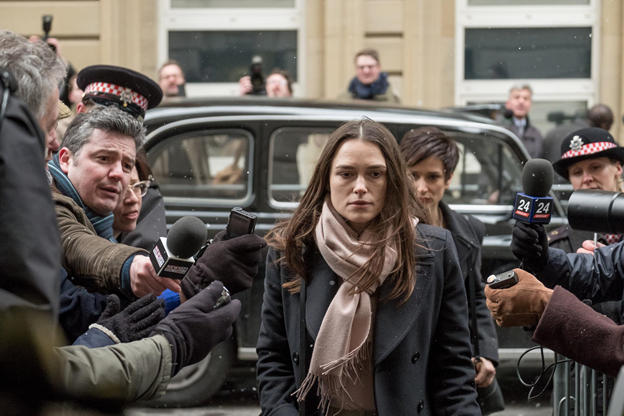
OFFICIAL SECRETS
Director: Gavin Hood
Genre: Drama
Someday some loser (me) is going to watch OFFICIAL SECRETS and think halfway through, “You could craft a perfect drinking game for this movie.” Like, take a drink every time Keira Knightley looks stressed out on a computer, take a drink every time someone mentions The Official Secrets Act, take a shot when Ralph Fiennes enters halfway through the film to save the day, finish your drink when a major conflict circles around grammar. In all seriousness, OFFICIAL SECRETS is… good! Shocking, coming from the director of X-MEN ORIGINS: WOLVERINE, Gavin Hood, but it’s a very focused film, a clean-cut political thriller that, yes, does center some of its drama around grammar. What separates OFFICIAL SECRETS from your average political drama is that ultimately it takes a rather anti-government stance—a notable line from the film is, “All our institutions failed us.” Kind of refreshing after walking out of THE REPORT in which the triumphant closing speech is delivered by… John McCain. Fascinating to watch after VICE (2018), this is the story of Katharine Gun, a British intelligence agent who leaked top-secret NSA information exposing the UK and US of spying on members of UN Security Council in hopes of blackmailing votes in favor of the Iraq War. Always exciting to see true stories about notable women on screen. Am I blinded by my passionate love for Keira Knightley here? Maybe. But OFFICIAL SECRETS is extremely fine, and will be entertaining enough when you inevitably watch it with your aunt next Thanksgiving. [Aya Lehman]

QUEEN OF HEARTS
Director: May el-Toukhy
Genre: Drama
May el-Toukhy’s QUEEN OF HEARTS is the consequence of the rise of step-family pornography—erotica focusing on desires so close to home, yet morally out of reach. Do I think people really want to fuck their family members? Not really. But it’s an extremity that maximizes the feeling of giving in to lustful action that you should resist, and that’ll do it for most folks. To approach this twisted euphoria with the eye of a dark drama is a fine enough idea, perhaps a revival of early-’90s sexpot thrillers, but QUEEN OF HEARTS just ain’t it, chief. It certainly has an interesting angle at the start: what if a prosecuting attorney who specializes in convicting domestic abusers had sex with her stepson and weaponized her skills to gaslight the kid after he threatens to go public. The ally becoming a proponent of rape culture: this is nasty, near-Verhoeven level maliciousness, but I struggle to find any of his observant insight. Its evil is inspired, but there are so many reiterations of the same central ideas that it renders the actions of the stepmother, Anne, played by a devilish Trine Dyrholm, so wearisome, not to mention the actions of every character so deeply illogical. The first domino of Anne’s downfall drops when she indulges in a quick makeout with her stepson at her own daughter’s birthday party, like, what?! QUEEN OF HEARTS tackles the Herculean task of approaching a pulp narrative with a realistic, naturalistic camera, the lens sensuously enveloped in each moment instead of standing back to proclaim a judgment. El-Toukhy craves the immediacy of these moments so as to reckon with them as real events, going as far as staging pornographic sex scenes. They really revel in the pleasures of the flesh, it’s one-hundred-percent mean to arouse. I may not have left el-Toukhy’s film with much, but at least I could check off “indie film with an unsimulated blowjob scene” off my Sundance bingo board. You could sit through this needlessly cruel, predictable, 127-minute erotic feature about a wife who sleeps with her stepson, but there are countless 28-32 minute alternatives out there just as titillating and morally obtuse. [Kevin Cookman]

THE REPORT
Director: Scott Z. Burns
Genre: Political Drama
Sub-Sorkin, self-congratulatory tripe that might make $30 mil in late September and live a moderately prosperous life on Redbox as the go-to Fincher riff that blots out any Fincher edge, THE REPORT tricks you into satisfaction because it’s charitable in doling out its own sense of it. Corner-mounted cameras, incessant wide angles that capture the scope of the investigation in contrast to the little men engaging within it, ugly fluorescent hues—effective, the movie definitely is fine to look at, but these are cheat codes, so ironic for a film dedicated to doing the work. There’s a faux-intellectual joy in media that tricks you into understanding the breadth of international politics by spoon-feeding exceedingly reductive, embellished dialogue. At least VICE was straight-forward in its farcical nature, its instilled self-importance sort of a key facet of the punchlines, but here? Played completely straight. Driver is great, and the film suffers each time it deviates from his control of the screen—he has this great trick where he’ll sputter out mid-line to either reveal his true opinion on a subject or to realize the complexity of his rhetoric and elect an uncomplicated alternative to explain the same point. Something as simple as “Counter-Terrorisim C- CTC” grounds the nonstop moralist exposition as some believable sort of human gesture. It’s bogged down by the pedantic, late-night-level allusions, like visually coding the petty unimportance of the CIA director addressing his worries of The Torture Report’s ramifications to McDonough by playing Obama’s infamous tan suit press conference on a background television, or framing Driver’s long face in between two (2) piled-high stacks of The Torture Report standing in for replicas of the World Trade Center towers during a critical voting session. Many characters are chided for not reading all 7,000 pages of Dan Jones’ report; Feinstein orders him to edit it down to 400. THE REPORT is the dime-novel account of an American nightmare by an author who barely skimmed either. [Kevin Cookman]

SWEETHEART
Director: JD Dillard
Genre: Horror
It’s Kiersey Clemmons versus a buff seahorse monster. That’s the gig. The complication with making a tight thriller, the difference that separates the amateurs from the masters, is the distinction between sparse and economic. Economy is brevity of exposition, but overflow of character; it is hitting the beats as efficiently as you can, so you can best highlight every limb moved and decision made by characters within those beats. Sparseness? When you have to sit and watch Kiersey Clemmons start a fire so she can heat up a freshly caught fish. And she cooks that fish. And she eats that fish. And we’re on to the next scene. Thrilling. The lone star of SWEETHEART is a barely defined protagonist: she seems to be a cunning survivalist, but other times, she’s acting like a total airhead about activities that would seem right up her alley based on how she’s previously cared for herself. The deepest the understanding of her character gets is in the central question of “is this a dumb girl or just some girl?” Learning her clumsily extolled backstory only brings up more unanswered questions. For its many wastes, SWEETHEART is not without its moments. The monster reveal is an all-timer, the oceanic horror visuals are properly disturbing (a dark, bottomless hole on the seafloor? No thank you.), and the synth score is gorgeous, but it carries the unwanted affectation of watching a 1987 cheapo shot behind the producer’s lake house. This is a barely masked contractual obligation. With day scenes that feel like Fyre Festival promo and night scenes that are barely visible, it just doesn’t feel like director JD Dillard’s heart is in this at all. That this is titled SWEETHEART is mostly a ploy to underline the weakly imparted feminist undertones of the picture, but make no mistake: it’s Kiersey Clemmons versus a buff seahorse monster. That. Is. The. Gig. That any other film was denied an audience at Sundance 2019 so that Blumhouse could preview a movie made to fulfill a moderate summer financial report, a product crafted solely to fill a slot, is abhorrent. [Kevin Cookman]
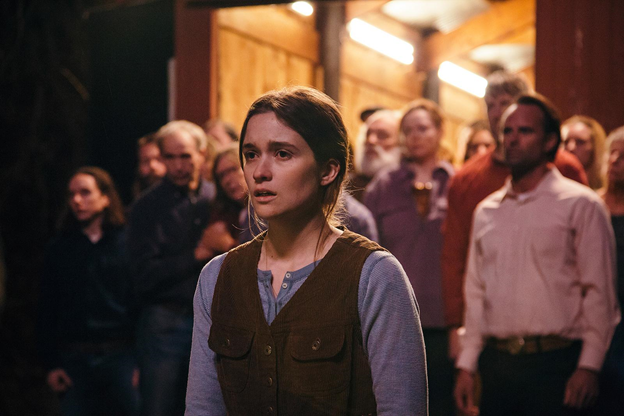
THEM THAT FOLLOW
Director: Britt Poulton and Dan Madison Savage
Genre: Drama
Sometimes you watch a movie and you’re like, oh yeah, this was written for me specifically. Walton Goggins and Olivia Colman in Appalachia wrangling snakes to prove themselves before God? It’s like I dreamed it. I missed the first 20 minutes of this thrilling drama, so I may fall on the more positive side of reviews because I potentially missed 20 minutes of straight exposition, but once FOLLOW gets going, it never lets up. At a certain point, Jim Gaffigan (in one of THREE films at Sundance 2019) pulls out an electric saw to cut someone’s limb off and I was so giddy with nerves that I let out a frantic giggle at the emotional peak of this film. Goggins and Colman deliver knockout performances, per usual, and it’s so exciting to finally see them in leading roles. Might appear to be your average indie film fodder, but nails that biting tension so well it’s absolutely worth a watch. [Aya Lehman]

TOP END WEDDING
Director: Wayne Blair
Genre: Comedy
It’s no surprise that almost half the audience left the theater about 20 minutes into TOP END WEDDING—this romp through the Top End of northern Australia isn’t exactly your average Sundance fare. Wayne Blair’s latest follows Lauren and Ned as they hurry to plan and execute their wedding in 10 days while searching for Lauren’s runaway mom. It begins as your run-of-the-mill romantic comedy, madcap adventure movie, but by the halfway point it takes on this completely different energy: Lauren’s father is white and her mother is Tiwi (an Indigenous group from Northern Australia). Lauren’s mother left home when she was 18 in order to marry Lauren’s father and raised Lauren without any information about her Tiwi culture. Suddenly it’s not about the wedding, it’s about Lauren’s lifelong confusion about being mixed race and her struggle to understand why her mom wouldn’t share this part of her life. I really can’t stress enough how infrequently this dilemma is shown on screen, and it affected this young mixed race girl so much more than I really anticipated. It’s always so refreshing to walk into a movie you think is a simple, sweet, fun time, and then just clocks you with an examination of a human experience that’s hauntingly similar to your own. TOP END WEDDING isn’t for everyone; it’s a little too cheery and maybe a bit too contrived for your average Sundance audience. But when it works, it really fucking works. Also Gwilym Lee is big time about to blow up. Watch that dude. [Aya Lehman]
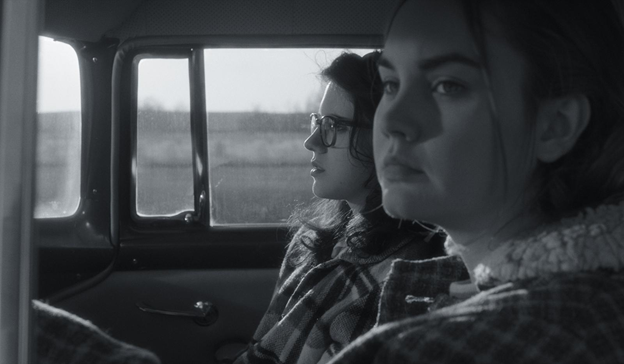
TO THE STARS
Director: Martha Stephens
Genre: Drama
At the Q&A, director Martha Stephens revealed that the screenplay for TO THE STARS was written 20 years ago and BOY DOES IT SHOW! It’s a story that every queer person has seen a million times: two girls are friends, one is the town loner, and, uh oh, one is gay! And oh baby does she hate that she’s gay! So she dates boys to try to convince herself and everyone else that she’s straight! And when everyone finds out she’s gay, she ~mysteriously disappears~ and it’s all very ~open ended~ but she ~might have killed herself~ but her best friend (who’s really distracted by her budding relationship with a boy) knows in her heart of hearts that she ran away. Queer storytelling has evolved so much in the last 20 years that this plotline is just stale. The best facet of this iteration is that the main character has a weak bladder and is constantly peeing her pants for over half the movie. TO THE STARS is still very sweet, and the friendship between the two girls is a pleasure to watch. Unfortunately, it offers no new insights about the queer experience and winds up with that same “Bury Your Gays” trope that straight filmmakers never seem to tire of! What a disappointment. [Aya Lehman]
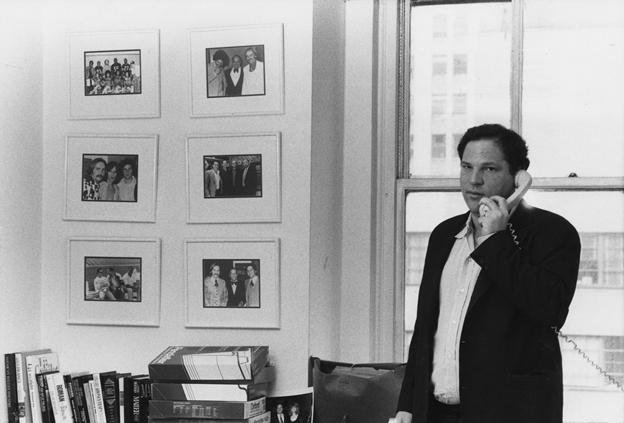
UNTOUCHABLE
Director: Ursula MacFarlane
Genre: Documentary
If there was a single concurrent theme amongst Sundance 2019’s documentaries, it was the quick-as-lighting turnarounds on these projects. Already we have a, or rather, what attempts to be, a comprehensive film overview of the Harvey Weinstein sexual assault allegation fallout and the birth of the #MeToo movement. Whereas many documentaries’ quick turnarounds are indebted to topical urgency or radical pleas for change, UNTOUCHABLE feels like the rushed hot take vying for “I did it first” retweets. I can see this working in 2080, where Weinstein is as recognizable a name as Fatty Arbuckle is now and one would want to inform themselves of this nefarious tycoon honcho from Old Hollywood, but now? We know this, and more. MacFarlane’s testimonials with Weinstein’s various courageous survivors are Earth-shaking on their own, but I have no clue why she decided to add mood music or those disgusting recreations of a first-person camera floating into hotel suites. The doc tactics at play aren’t even tasteless, they’re tacky. UNTOUCHABLE would be a majorly flawed, yet ultimately valuable piece of captured history under any other circumstances, but here? We have a documentary about Harvey Weinstein premiering at Sundance that bears absolutely zero mention of Sundance… What, huh? Hold on. Huh? The party scene he largely fostered so as to use the festival as his hunting grounds, that just… Gets zero mention? Huh. Okay. Now we got issues. [Kevin Cookman]

WE ARE LITTLE ZOMBIES
Director: Makoto Nagahisa
Genre: Drama
By the end of WE ARE LITTLE ZOMBIES, the thesis statement is clear: “Adults get mad if you don’t have a dream.” Our four main heroes’ parents are dead and every surrounding adult is incompetent, leaving our young protagonists to fend for themselves in the face of inevitable chaos and a fair amount of emptiness. But their emptiness does not phase them, and the group develop a deep bond rooted in their shared rejection of societal expectations and start a band. But via their band they find success, a success that they realize too late brings them no joy and hinders them from processing the lasting trauma inflicted by their parents’ untimely deaths, so they dissolve the band in pursuit of being “normal kids.” It’s your average Kids Form A Band™ movie that stops halfway through in favor of finding something deeper than fame—they find satisfaction in the great unknown. It’s that life-affirming nihilism that our generation clings to, and ZOMBIES captures it perfectly. The winner of the World Cinema Dramatic Special Jury Award for Originality, it’s almost unbelievable that this is director Makoto Nagahisa’s feature debut [Aya Lehman]
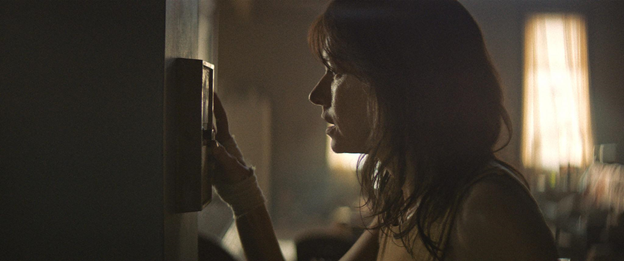
THE WOLF HOUR
Director: Alistair Banks Griffin
Genre: Psychological Drama
Ah, yes. Yes, yes, yes. For every film festival I’ve attended, I’ve carried with me the same two goals: watch a new all-time favorite and watch the most racist movie I can possibly find and burn it to the ground. Ladies and gentlemen, welcome to the latter. Alistair Banks Griffin’s vile reconstruction of New York’s scorching Summer of Sam as seen via peepholes, windowsills, and a queasy color palette of greens follows an agoraphobic Naomi Watts as a stone-cold lookalike of Nicole Kidman in DESTROYER, a fellow alum of the school of eyeliner-as-dirt, as she holes herself up in her grungy, inner-city apartment to avoid the definitely-not-strongly-racially-coded fears of the outside world. I’m not one to spoil a festival film, seen by so few and still in the running to attract greater audiences, but I will not confirm nor deny that this waste of a narrative, taking place entirely within the apartment with nothing but her and talk show interviews inexplicably replayed with the sole intention of explaining her backstory to the audience occupying the space, ends with the inhabitants of Watts’ ghetto rioting in the streets and burning the block to the ground, thus causing Watts to bravely walk outside amongst the wreckage and reawaken into her former self, her inner pains healed once and for all via destruction of those she feared. I will not confirm nor deny that this actually happens in a film looking to release in the year 2019, but wow, can you imagine if a film had a conclusion so ghastly and wrong-minded and still wanted to be seen by others? That’d be wild. I will not confirm nor deny this lunkheaded, MAGA attempt at chamber drama, but THE WOLF HOUR can still choke on it. [Kevin Cookman]
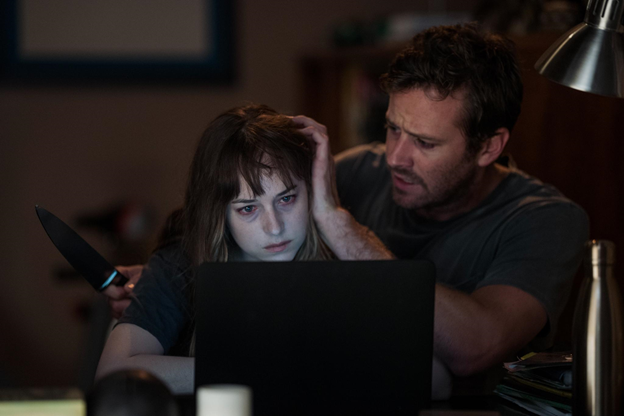
WOUNDS
Director: Babak Anvari
Genre: Horror
The absolute energy, the hubris of opening your midnight horror wannabe b-movie starring Armie Hammer with a HEART OF DARKNESS quote. WOUNDS is so close to nailing something that it’s infuriating to watch it flounder as it struggles to make anything out of its increasingly hollow plot. Armie Hammer is Will, a bartender in New Orleans who picks up a college kid’s phone and starts to encounter bizarre and gruesome happenings. It starts out pretty strong, with some solid, creepy jumpscares, but after awhile it jumps the rails and descends into… something else. The biggest mystery about WOUNDS is what the film expects from you—are you supposed to laugh? Be terrified? Grossed out? Did I not get it? Did I expect too much? Is this one of Armie Hammer’s best performances on screen? Why is Dakota Johnson even here if they’re not even going to try to give her more than just “Armie Hammer’s girlfriend?” I don’t know. Our theater was laughing riotously, and I couldn’t help but snort when I saw a copy of Kafka’s METAMORPHOSIS tucked ever so carefully in the background of a shot of a cockroach. Am I overthinking this? Definitely. Does Armie Hammer look extremely hot no matter how unshowered he is? Hell yeah. [Aya Lehman]




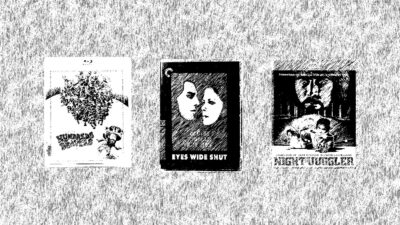











Comments